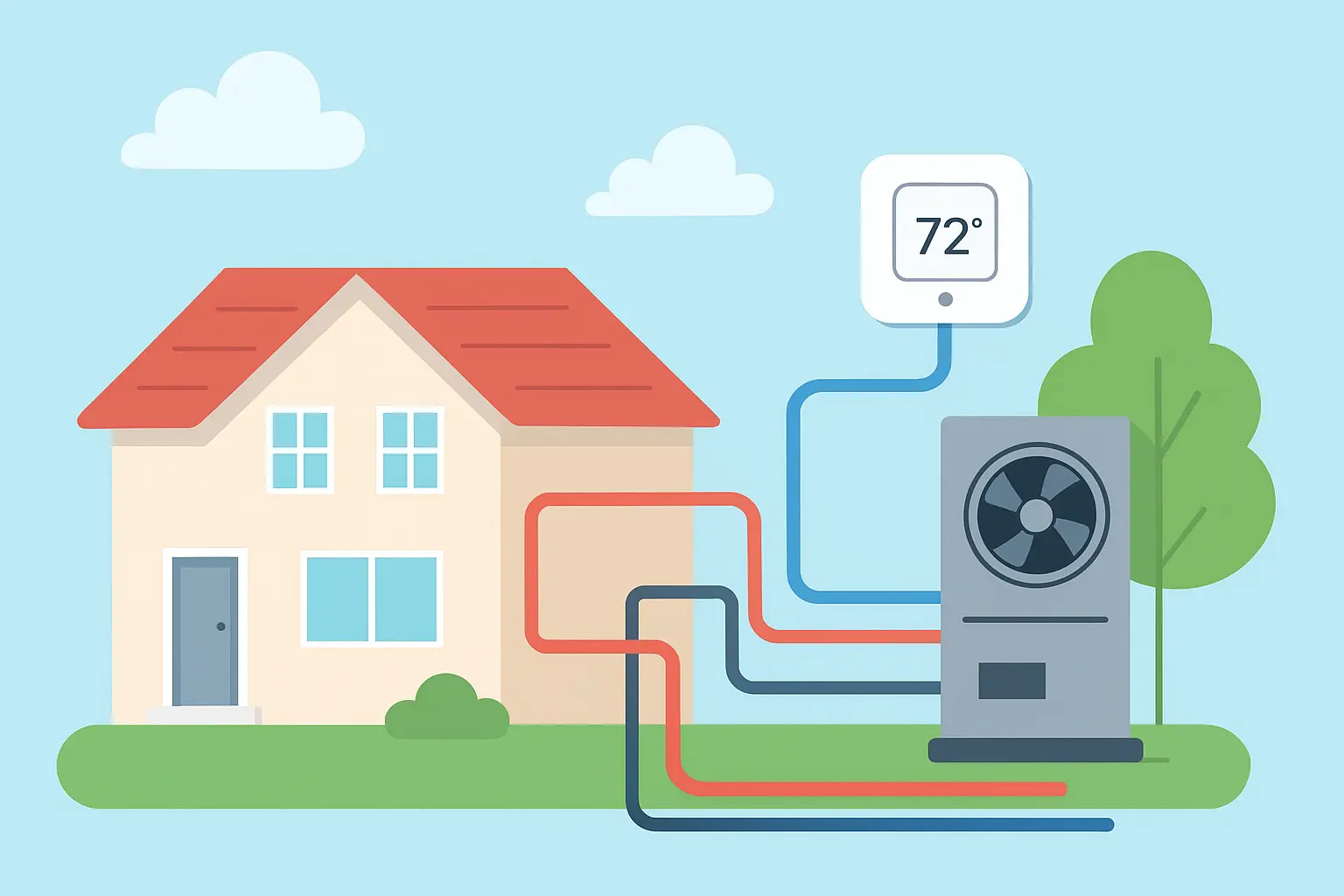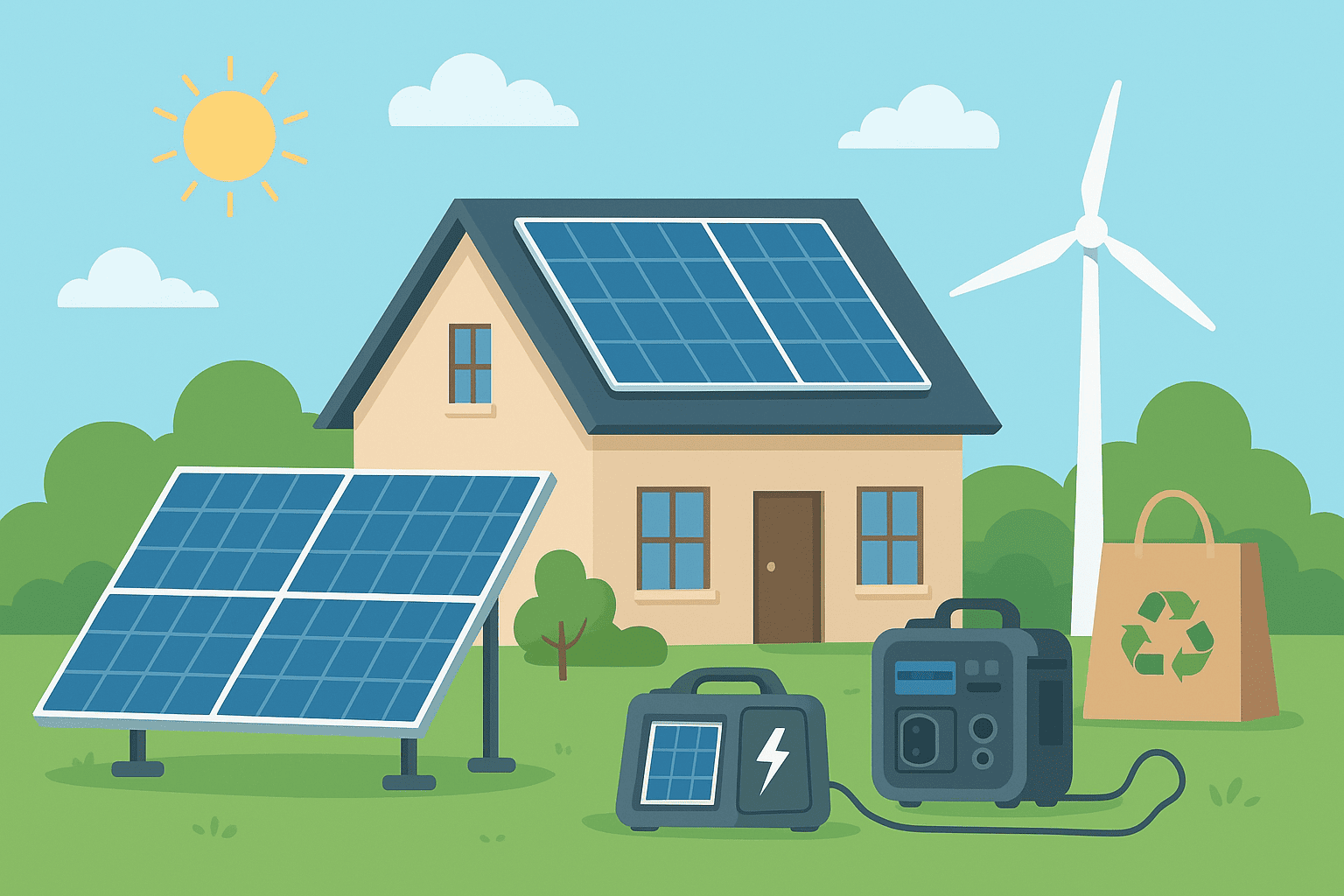Table of Contents
- Introduction: Why Energy-Efficient HVAC Matters
- 1. Why Energy-Efficient HVAC Matters
- 2. Understanding HVAC Efficiency Ratings
- 3. Choosing the Right System for Your Climate
- 4. Key Features of Energy-Efficient HVAC Systems
- 5. Top Energy-Efficient Products I Recommend
- 6. Maintenance Tips to Keep Your System Efficient
- 7. Benefits of Upgrading
- 8. Common Mistakes to Avoid
- Closing Thoughts 💭
- Frequently Asked Questions ❓
- Sources and Further Reading 💡
⚠️ When shopping for HVAC systems, we strongly recommend checking out Amazon's daily deals for potential savings. These promotions often change, so reviewing them before purchasing can help you find the best price on the right model. Make sure you don't miss out!
📌 This post may contain affiliate links, so we may receive compensation if you purchase products linked to below. As an Amazon Associate, I earn from qualifying purchases. This helps support our work and allows us to create more helpful content for you. Read our disclosure for more information.
Introduction 📜
When I first started looking for "the most energy-efficient HVAC system", I realized it’s more than just picking a single unit. HVAC (Heating, Ventilation, and Air Conditioning) is a combination of systems that work together to keep your home comfortable, healthy, and energy-efficient.
From heating and cooling units to ventilation systems, each component plays a role in saving energy and maintaining precise climate control. The best setups use modern technology like smart thermostats, variable-speed compressors, and zone-based heating and cooling to adjust energy use based on the needs of different areas in your home.
Choosing high-efficiency equipment—like Energy Star-certified air conditioners or heat pumps—not only lowers energy consumption but also reduces utility costs over time.
I’ve also learned that proper ventilation is essential for good air quality and humidity control. Well-designed ductwork and modern air handlers ensure smooth airflow so your system doesn’t have to overwork to maintain the perfect temperature.
In the end, a well-integrated, energy-efficient HVAC system provides the perfect balance of comfort and energy savings, making a noticeable difference in your home and for the environment. 👇
🥇 Ecobee SmartThermostat
Pros
✓ Smart Sensor Functionality: Uses remote sensors to balance temperature across multiple rooms, prioritizing comfort in occupied areas and reducing hot or cold spots.
✓ Energy Savings & Automation: ENERGY STAR certified and uses occupancy detection and programmable schedules to optimize heating and cooling, potentially reducing energy costs by up to 26% per year.
✓ Smart Home Integration: Works with Alexa, Siri, and Google Assistant, and can be controlled via iOS or Android devices. Supports HomeKit, GeoFencing, and routines for automated temperature adjustments.
Cons
✗ Wi-Fi Dependence: Requires a stable 2.4 GHz Wi-Fi connection; performance may be affected in areas with spotty Wi-Fi.
✗ Setup Complexity for Certain Systems: While installation is generally straightforward, homes without a C-wire or with complex HVAC setups may require the included Power Extender Kit or additional wiring adjustments.
Top Recommendation: Ecobee SmartThermostat
I find the Ecobee SmartThermostat to be a top choice for anyone who wants comfort, efficiency, and smart home integration. Its advanced sensors and intelligent automation help me balance temperatures across my home, reduce energy waste, and easily connect with my other smart devices. With energy-saving features and simple controls, it makes managing my HVAC system much easier while keeping energy costs down.
| Choosing the Most Energy-Efficient HVAC System: Key Considerations 📌 | |
|---|---|
| ✓ Professional Consultation | Consult an HVAC technician to find the best system tailored for your home and climate needs. 🛠️ |
| ✓ Efficiency Ratings | Look for energy efficiency ratings such as SEER, EER, and Energy Star certification to ensure optimal performance. 🌟 |
| ✓ Climate Considerations | Different climates require specific HVAC systems to achieve maximum efficiency. 🌦️ |
| ✓ Modern Features | Modern features like variable speed compressors and smart thermostats can significantly enhance your system's efficiency. 📱 |
| ✓ Regular Maintenance | Consistent maintenance is crucial to keeping your HVAC system running at peak efficiency. 🧰 |
1. Why Energy-Efficient HVAC Matters
Choosing an energy-efficient HVAC system is more than just picking a unit. HVAC (Heating, Ventilation, and Air Conditioning) combines multiple systems that work together to keep your home comfortable, healthy, and energy-efficient. Each component—from heating and cooling units to ventilation systems—contributes to overall energy savings and optimal indoor climate control.
Modern HVAC setups use advanced technologies such as smart thermostats, variable-speed compressors, and zone-based heating and cooling to reduce energy consumption based on precise needs in different areas of your home. High-efficiency equipment, like Energy Star-certified air conditioners or heat pumps, not only lowers energy usage but also optimizes long-term cost savings.
Proper ventilation maintains air quality and humidity levels, which enhances both comfort and system efficiency. Well-designed ductwork and modern air handlers improve airflow, preventing the system from overworking to maintain the desired temperature. Ultimately, a well-integrated, energy-efficient HVAC system creates a sustainable balance of comfort and energy savings, benefiting both your home and the environment.
2. Understanding HVAC Efficiency Ratings
Understanding HVAC efficiency ratings is key to choosing a system that saves energy and reduces utility bills. Ratings like SEER (Seasonal Energy Efficiency Ratio) measure how efficiently an air conditioner cools your home over an entire season, while EER (Energy Efficiency Ratio) measures efficiency at a specific temperature. Higher ratings indicate a system that uses less electricity to achieve the same level of comfort.
For heating, ratings like HSPF (Heating Seasonal Performance Factor) and AFUE (Annual Fuel Utilization Efficiency) are important. HSPF evaluates the efficiency of heat pumps, while AFUE measures how efficiently furnaces convert fuel into heat. Selecting systems with high efficiency ratings ensures your HVAC system operates optimally, saves money on energy costs, and reduces your environmental footprint.
Additionally, look for Energy Star-certified systems. These products meet strict standards set by the Environmental Protection Agency (EPA), guaranteeing energy savings, lower utility bills, and a smaller carbon footprint. The same principle applies across household appliances—for example, choosing the most energy-efficient mini refrigerators can complement an efficient HVAC system and help build a truly energy-smart home. By understanding these ratings, you can make an informed choice that balances comfort, savings, and environmental responsibility.

SEER Rating is a crucial measurement system for energy efficiency
Source: Paradigm Cooling (Accessed September 4, 2024).
3. Choosing the Right System for Your Climate
Different climates require different HVAC solutions. Here’s what worked for me:
- Hot Climates: I found that air-source heat pumps are excellent for cooling efficiently year-round. They run entirely on electricity, making them both green and cost-effective in warm weather. For homeowners aiming at full independence, pairing them with an off-grid solar kit or a solar generator for home backup can create a reliable, self-sustaining system.
- Cold Climates: For colder areas, geothermal heat pumps or high-efficiency furnaces worked best for me. The installation costs are higher, but the energy savings over time are significant. Since outages in freezing weather can be especially challenging, I also recommend considering one of the best home generators for power outages to ensure your heating system stays operational during emergencies.
- Moderate Climates: Living in a moderate climate, I chose a hybrid system that combines a heat pump with a furnace. Ductless mini-splits were another flexible option I considered for parts of my home without ductwork—an approach that also aligns well with off-grid living strategies.
4. Key Features of Energy-Efficient HVAC Systems
When choosing an energy-efficient HVAC system, look for key features that optimize performance and reduce energy consumption:
- Variable-Speed Compressors: Adjust power based on your home’s needs, saving energy while maintaining a consistent temperature.
- Smart Thermostats: Learn your schedule, optimize energy usage, and allow remote control while tracking your savings. Pairing them with a full home energy management system can further boost efficiency.
- Zoning Systems: Heat or cool specific rooms instead of the entire house, reducing waste.
- Energy Star Certification: Ensures the system meets strict efficiency standards.
Combined, these features help lower energy bills and extend the lifespan of your system, making it a cost-effective and environmentally friendly choice. For additional ways to maximize savings, consider integrating energy-saving devices for home into your setup.
5. Top Energy-Efficient Products I Recommend
| Product Type | Price Range | Recommended Product | Why Is This Useful? | Key Features | Rating |
|---|---|---|---|---|---|
| 1. Central Air Conditioners | $$$ |
Goodman 3.5 Ton 14.3 SEER2 Central Air Conditioner 
|
Efficient central AC units provide whole-home cooling with energy-saving technologies. | High SEER Rating, Energy Star Certified, Quiet Operation |
|
| 2. Mini-Split Heat Pumps | $$ - $$$ |
Della 36K BTU (12K 12K 12K 12K) ODU Quad 4 Zone Mini Split AC 
|
Mini-splits offer flexible and efficient cooling and heating solutions for different zones in a home. | Inverter Technology, WiFi Enabled, High SEER and HSPF Ratings |
|
| 3. Smart Thermostats | $ - $$ |
ecobee Smart Thermostat Premium with Smart Sensor and Air Quality Monitor 
|
Smart thermostats optimize HVAC operation based on user behavior, enhancing comfort and efficiency. | Voice Control, Remote Access, Learning Capabilities |
|
| 4. Furnace Filters | $ |
Filtrete 20x25x1, AC Furnace Air Filter 
|
High-quality furnace filters improve indoor air quality and maintain HVAC system efficiency. | MERV Rating 11, Captures Dust and Allergens, Long-Lasting |
|
| 5. Dehumidifiers | $ - $$ |
AEOCKY 52 Pint Energy Star 2024 Dehumidifier 
|
Efficient dehumidifiers help maintain optimal humidity levels and improve indoor air quality. | Energy Star Rated, Large Capacity, Quiet Operation |
|
| 6. Air Purifiers | $ - $$ |
Honeywell HPA5300B 
|
Air purifiers reduce indoor air pollutants, including allergens and bacteria, promoting healthier living spaces. | HEPA Filter, Energy Star Rated, High CADR (Clean Air Delivery Rate) |
|
| 7. Humidifiers | $ - $$ |
LEVOIT Humidifiers for Bedroom Home 
|
Humidifiers maintain optimal humidity levels, improving comfort and preventing dry air issues. | Ultrasonic Technology, Quiet Operation, Auto Shut-Off |
|
| 8. Ventilation Fans | $ - $$ |
Broan-Nutone QTXE150 Ultra-Silent Energy Star Certified Bath Fan 
|
Ventilation fans help remove excess moisture and odors, enhancing indoor air quality. | Energy Star Certified, Quiet Operation, Easy Installation |
|
| 9. Ductless Mini-Split Systems | $$ - $$$ |
PIONEER Air Conditioner Mini Split Heat Pump 
|
These systems provide zoned heating and cooling without the need for ductwork. | Inverter Technology, High SEER, Energy Star Rated |
|
| 10. Portable Air Conditioners | $ - $$ |
24" Windowless Portable Air Conditioner 
|
Portable AC units offer flexibility in cooling individual rooms or spaces without permanent installation. | Compact Design, Programmable Timer, Energy Efficient |
|
6. Maintenance Tips to Keep Your System Efficient
Even the best HVAC system needs regular care. Here’s a quick checklist:
- Change Air Filters: Every 1–3 months. Clean airflow = lower energy use.
- Inspect Outdoor Unit: Remove debris to maintain airflow.
- Seal Air Leaks: Windows, doors, and ducts.
- Professional Inspections: Twice a year to catch issues early.
- DIY Tips: Trim plants around the unit, clean gutters, use programmable thermostats.
7. Benefits of Upgrading to an Energy-Efficient HVAC System
Upgrading to an energy-efficient HVAC system offers several key benefits that improve comfort and reduce costs.
- Lower Energy Bills: High-efficiency systems use less power.
- Reduced Environmental Impact: Less fuel = fewer emissions. For a broader perspective on how these savings connect to sustainability initiatives, see how carbon markets are driving decarbonization.
- Enhanced Comfort: Smart tech ensures consistent temperatures.
- Increased Property Value: Energy-efficient homes are more attractive to buyers.
Investing in efficiency pays off in both comfort and long-term savings.
8. Common Mistakes to Avoid
Avoid these common mistakes when selecting or maintaining your HVAC system:
- Ignoring Insulation: A fancy HVAC system can’t compensate for poor insulation.
- Skipping Maintenance: Neglect shortens lifespan and raises bills.
- Choosing Only by Price: A cheap unit may cost more in energy and repairs over time.
- Incorrect Sizing: Too big or too small = inefficiency and wasted money.
Closing Thoughts 💭
In today’s world where energy efficiency matters, choosing an energy-efficient HVAC system is one of the smartest decisions for your home. With rising energy costs and growing environmental concerns, modern HVAC technologies—such as variable-speed compressors, smart thermostats, and zoned heating and cooling—help save energy, lower utility bills, and improve indoor comfort. By selecting high-efficiency units and maintaining them properly, you can enjoy a comfortable home year-round while contributing to a greener future. For homeowners looking to take the next step, pairing efficient HVAC with the right solar panels can create an even more sustainable and cost-effective energy solution.
FAQs❓
1. What does SEER rating mean for HVAC systems?
+SEER stands for Seasonal Energy Efficiency Ratio, which measures how efficiently an air conditioner or heat pump cools over a season. Higher SEER ratings mean lower energy bills and more efficient cooling.
2. Why is Energy Star certification important for HVAC systems?
+Energy Star-certified HVAC systems meet strict energy efficiency guidelines, helping you save money on electricity bills, reduce environmental impact, and sometimes qualify for rebates or tax credits.
3. How do I choose the most energy-efficient HVAC system for my home?
+Choosing the right system depends on your home size, insulation, climate, and budget. Consider options like high-efficiency furnaces, heat pumps, or ductless mini-splits, and consult an HVAC professional for the best recommendation.
4. What are the main benefits of upgrading to an energy-efficient HVAC system?
+Benefits include lower energy costs, reduced carbon footprint, better indoor comfort, and longer system lifespan. Efficient systems also tend to require less maintenance over time.
5. What is a variable speed compressor, and why is it important?
+A variable-speed compressor adjusts its speed to match your heating or cooling needs, improving energy efficiency and maintaining more consistent indoor temperatures.
6. How often should I maintain my HVAC system for peak efficiency?
+Professional inspections at least once a year and DIY maintenance like changing filters monthly or quarterly keeps your system running efficiently and prevents costly repairs.
7. What’s the difference between a heat pump, furnace, and hybrid HVAC system?
+
Understanding the differences helps you choose the right system for your climate:
- Heat pumps: Efficient in moderate to warm climates.
- Furnaces: Reliable in cold climates.
- Hybrid systems: Combine heat pumps and furnaces for year-round efficiency.
8. How much can I save by switching to an energy-efficient HVAC system?
+Savings depend on your current system, home size, and climate, but many homeowners see 20–50% reductions in heating and cooling costs over time.
9. Do energy-efficient HVAC systems qualify for tax credits or rebates?
+Many Energy Star-certified systems and high-efficiency installations qualify for federal, state, or local rebates, reducing upfront costs.
10. Are ductless mini-splits worth it for parts of the home without ducts?
+Ductless mini-splits are ideal for rooms without existing ductwork, offering high efficiency, zoned heating/cooling, and lower installation costs than adding ducts.
11. What is the expected lifespan of an energy-efficient HVAC system?
+Modern systems typically last 15–20 years, but proper maintenance can extend the life while maintaining efficiency.
12. How do energy-efficient HVAC systems improve indoor air quality?
+Many efficient systems include advanced filtration, humidity control, and ventilation, which reduce allergens, dust, and pollutants, improving overall indoor air quality.
Further Reading: Energy-Efficient HVAC Systems
- ENERGY STAR: Most Efficient 2025 HVAC Systems – Official list of HVAC systems recognized for top energy efficiency, helping homeowners reduce energy costs and environmental impact.
- ENERGY STAR: Certified Air Source Heat Pumps – Find and compare ENERGY STAR certified heat pumps that deliver high performance, lower utility bills, and improved comfort.
- ENERGY STAR: Recognition Criteria for Air Source Heat Pumps – Detailed technical standards for high-efficiency heat pumps, including SEER2, EER2, and HSPF2 ratings for optimal energy savings.












